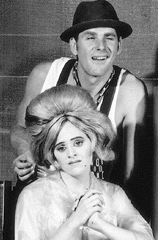Canadian Theatre Encyclopedia
Messier, Jean-Frédéric

Quebec-based director/playwright/musician, known world-wide for his imagistic and iconoclastic approach to theatre.
Jean-Frédéric Messier began working in theatre in 1986 after graduating from Collège Jean-de-Brébeuf. From the start he was experimenting with elements of multimedia (which have since become integral to much of his output).
Works he was involved with have travelled internationally, such as Fence which was presented in Amsterdam, Brussels and Paris.
Displeased with how traditional theatre was not reaching young audiences, he decided to work on forms that would appeal to the minds that were being shaped by computers, music video and television. To this end, he worked often with the Festival Réalité Jeunesse, an event that presents new theatre aimed at young audiences.
In 1988 he became writer-in-residence for Théâtre Petit à Petit and formed the Théâtre du Blé rare which the following year became Momentum.
While mounting his play Le Dernier délire permis with Momentum, he also worked as Robert Lepage's assistant on Echo, Plaques Tectoniques and Visite de la vieille dame.
A new school of important young theatre artists emerged around Messier (and occasionally worked with him) who were addressing a younger audience in either new ways or in synthesizing some of the techniques of the 60s (multimedia): Michel Monty, Wajdi Mouawad, Dominic Champagne, and Jean-François Caron among them.

In 1991, Messier's production of Nuits Blanches (with texts by Louise Bombardier, Éric Charpentier, Claude Poissant, Pierre-Yves Lemieux, Lise Vaillancourt, Jean-François Caron, and Michel Garneau) caused critical controversy about the face of young theatre. The play spoke plainly of young urban life.
Messier, Champagne, Caron and Pascale Rafie came to international attention in 1992 when the work Cabaret Neiges Noires began to play across the province and in festivals world-wide.
Messier went on to direct his own high-energy multimedia work of huge dimensions in 1994: Helter Skelter was a contemplation of all the icons of the 60s that have fed into the 90s. He followed this production with the equally éclaté Oestrus in 1996.
Jean-Frédéric Messier has also directed for the young people's company, Théâtre des Confettis: in 1993, he directed Jeanne-Marc Chevalière de la Tour; and in 1998, Un éléphant dans le coeur which won a Masque Award in February, 2000.
He has composed and performed music for his own works and with companies across the province.
Profile by Gaetan Charlebois.
Last updated 2021-05-08

